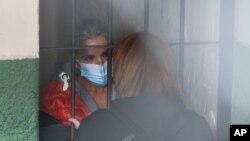Former Bolivian president Jeanine Anez has been sentenced to four months pre-trial detention. She was arrested on charges of terrorism, sedition, and conspiracy linked to the resignation of her predecessor Evo Morales in what he claims was a coup d'etat.
Tens of thousands of Bolivians have taken to the streets to protest the arrest and detention of former president Anez.
The United States is following with concern the developments surrounding the arrest of Anez and several other former government officials, said State Department deputy spokesperson Jalina Porter. “We urge our friends and neighbors in Bolivia to uphold all civil rights and due process guarantees of the American Convention on Human Rights and the principles of the Inter-American Democratic Charter.”
Former President Anez came to power in November 2019 after Morales resigned following protests over electoral fraud related to his efforts to secure reelection to an unconstitutional fourth term. As Morales fled Bolivia, Anez was the most senior parliamentarian left and was sworn in by the legislature as the interim president despite the lack of a quorum. Morales and his MAS party allies then claimed they had been the victims of a coup.
“Our concern joins those expressed by civic, political, and religious leaders in Bolivia as well as by those in the international community,” said Ms. Porter.
In a statement, the Organization of American States expressed its "concern about the abuse of legal mechanisms that once again have been transformed into instruments of repression by” Bolivia’s MAS party.
"The Bolivian judicial system is not in a position to provide the minimum guarantees of a fair trial," the OAS said.
It went on to call for "the liberation of all those detained in this context, until impartial processes and mechanisms can be put in place to determine responsibilities."
Many countries in the Western Hemisphere, including the United States, believe that democratic rule of, by, and for the people is a principle that must be upheld. There is also consensus that democratic institutions, such as the judicial system, should remain free of political interference.














